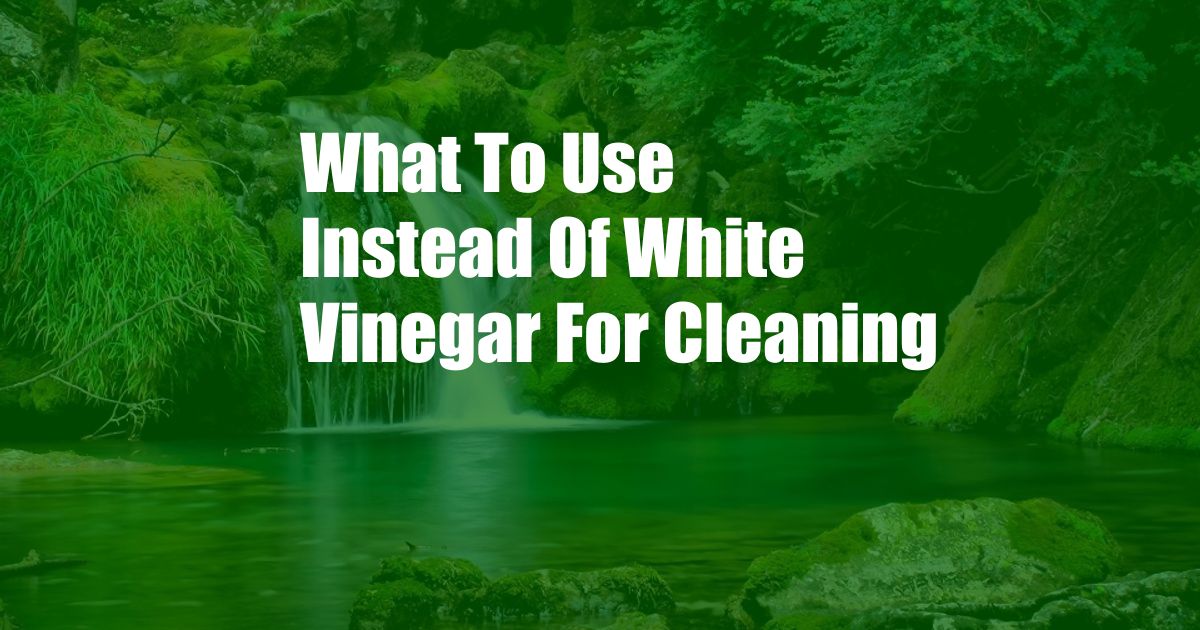
What to Use Instead of White Vinegar for Cleaning
White vinegar is a great all-purpose cleaner, but it’s not always the best choice for every job. If you’re looking for a more natural or gentle cleaner, there are plenty of other options to choose from. Here are a few of the best substitutes for white vinegar for cleaning:
Lemon juice is a natural disinfectant and deodorizer. It’s also a good choice for cleaning surfaces that are prone to staining, such as granite and marble. To use lemon juice as a cleaner, mix equal parts lemon juice and water in a spray bottle. You can also add a few drops of essential oil, such as tea tree oil or lavender oil, for extra cleaning power.
Baking Soda
Baking soda is a mild abrasive that can be used to clean a variety of surfaces, including countertops, sinks, and ovens. It’s also a great odor absorber. To use baking soda as a cleaner, make a paste with equal parts baking soda and water. Apply the paste to the surface you want to clean and let it sit for a few minutes. Then, scrub the surface with a sponge or cloth and rinse with water.
Hydrogen peroxide is a powerful disinfectant that can be used to clean and whiten a variety of surfaces. It’s also effective at removing stains. To use hydrogen peroxide as a cleaner, mix equal parts hydrogen peroxide and water in a spray bottle. You can also add a few drops of essential oil, such as tea tree oil or lavender oil, for extra cleaning power.
Castile soap is a natural soap that is made from vegetable oils. It’s a gentle cleaner that can be used on a variety of surfaces, including skin, hair, and clothing. To use castile soap as a cleaner, mix a few drops of soap with water in a spray bottle. You can also add a few drops of essential oil, such as tea tree oil or lavender oil, for extra cleaning power.
Other Natural Cleaning Options
In addition to the options listed above, there are a number of other natural cleaning options available. These include:
- Apple cider vinegar
- Borax
- Washing soda
- Salt
- Olive oil
When choosing a natural cleaning option, it’s important to consider the surface you’re cleaning and the type of stain you’re trying to remove. Some natural cleaners are more effective on certain surfaces than others. It’s also important to test the cleaner on a small area before using it on a large surface.
Tips and Expert Advice for Cleaning
Here are a few tips and expert advice for cleaning:
- Always test a new cleaner on a small area before using it on a large surface.
- Use a microfiber cloth to clean surfaces. Microfiber cloths are more effective at removing dirt and grime than traditional cloths.
- Don’t over-clean. Over-cleaning can damage surfaces and remove the natural oils that protect them.
- Open windows when you’re cleaning to ventilate the area.
- Use natural cleaning products whenever possible.
Cleaning your home doesn’t have to be a chore. By using the right cleaning products and techniques, you can make it a quick and easy task. And by using natural cleaning products, you can help protect your family and the environment.
FAQ on Cleaning
Here are a few frequently asked questions about cleaning:
- What is the best way to clean a kitchen?
- What is the best way to clean a bathroom?
- What is the best way to clean a living room?
The best way to clean a kitchen is to start by wiping down all surfaces with a damp cloth. Then, clean the stovetop, oven, and microwave. Finally, mop the floor.
The best way to clean a bathroom is to start by wiping down all surfaces with a damp cloth. Then, clean the toilet, sink, and bathtub. Finally, mop the floor.
The best way to clean a living room is to start by vacuuming the floor. Then, dust all surfaces and furniture. Finally, wipe down all surfaces with a damp cloth.
By following these tips, you can keep your home clean and tidy without using harsh chemicals.
Conclusion
There you have it! A comprehensive guide on what to use instead of white vinegar for cleaning. We hope this article has helped you find the perfect natural cleaning solution for your needs. If you have any questions or comments, please feel free to leave them below. We’d love to hear from you!
Are you interested in learning more about natural cleaning? Check out our other blog posts on the topic: